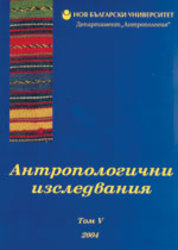Журфикс: принос към историческата антропология в България
Le jour fixe: a contribution to the historical anthropology of Bulgaria
Author(s): Rayna GavrilovaSubject(s): Anthropology
Published by: Нов български университет
Keywords: Historical Anthropology; Bulgaria
Summary/Abstract: The text sets out to explore the history and the meaning of new forms of social life - the jour fixe and the soiree - which have come into existence in Bulgaria with the modern epoch. The thesis developed here claims that these forms have an important role to play in the transformation of the shared understanding about the order of the social world, i.e. of the culture.The need and the practice among people of a given community to get together on a regular basis and without a special purpose have a clear cultural meaning. The visit is a quintessential form of human socialization for the sake of socialization. The occasional but regular, voluntary yet purposeless gatherings are conceived of here as activities fundamental for maintaining social life. Therefore, the appearance of new forms seems to be a key element in the study of the change (history) and the meanings (anthropology) of a community. In traditional societies, visits are the main form of casual gatherings practiced mostly among relatives and neighbors. By mid-nineteenth century new forms of visits appear in Bulgarian cities - the regular day for visiting and the soiree (evening gathering of non-relatives of both sexes), which become part of the social scene. In the first years after the restoration of the independent Bulgarian state they become the predominant form of socializing of the nascent urban elites in the large cities: politicians, high- and medium-ranking administrators, journalists, intellectuals, entrepreneurs. These gatherings make possible the establishment of new relationships, vital for the normal functioning of the city and the society. The jour fixe in its classical form is a vivid expression of the gradual rearrangement of the social life in the transition to modern life. The regular day for hosting visits without specific purpose and invitation effectively creates places and times for public life where one could identify under a magnifying glass several modes of interpersonal and collective interactions: acquisition, sharing, comparison, competition, cooperation, accommodation, etc. They are the space where positions and statuses are presented and defended, where public opinion takes its origin. The paper provides testimony of the emergence of these new forms and possible explanations and interpretations as to their social meaning.
Journal: Антропологични изследвания
- Issue Year: V/2004
- Issue No: 1
- Page Range: 37-49
- Page Count: 13
- Language: Bulgarian
- Content File-PDF

